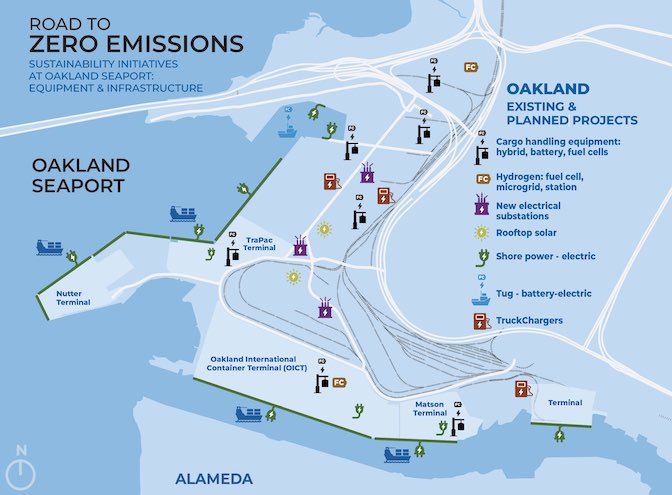Port of Oakland leaders joined the Port Decarbonization & Green Shipping Corridor Symposium today to discuss the important work being done to reduce greenhouse gas footprints globally and locally. Port of Oakland Executive Director Danny Wan addressed port industry colleagues on the latest projects being implemented at Oakland to significantly cut carbon emissions from port and maritime shipping operations. California State Transportation Agency (CalSTA) and the Japanese Ministry of Land, Infrastructure, Transport, and Tourism (the Ministry) convened the Symposium in Los Angeles, CA today.
“We are grateful to the California State Transportation Agency and the Ministry for bringing together our ports that share the critical supply chain between Japan and California,” said Port of Oakland Executive Director Danny Wan. “We benefit from each other's knowledge on the development and deployment of technologies to reduce planet-warming emissions.”

Japan is a major U.S. trade partner and a top destination for U.S. exports from Oakland. This cargo business accounts for 16% of all exports leaving from the Oakland Seaport.
One part of the event included the signing of a MOU (Memorandum of Understanding) to accelerate decarbonization of the supply chain between Oakland and Japanese ports. The Green Shipping Corridor MOU was signed Thursday, October 19, 2023, by officials from the Port of Oakland, USA, and the Port of Yokohama, Japan. It paves the way to share best practices on implementation of green initiatives to transform operations all along the supply chain.
“Japan has demonstrated its commitment to decarbonization initiatives and partnerships to achieve these ambitious goals,” said Port of Oakland Executive Director Danny Wan. “Agreements like this MOU are an essential part of establishing the explicit intent to reduce emissions and implementation of worthy projects that can get the job done. We look forward to working collaboratively with the Port of Yokohama and hope that our ports’ efforts inspire others around the world to do the same.” The MOU builds on the Ports of Oakland’s and Yokohama’s 43 years of history as sister ports since May 2, 1980.
Port of Oakland Chief Operations Officer Kristi McKenney, who is leading the port’s zero-emissions initiatives and was an official signing witness to the MOU, said “Thanks to our staff of talented environmental scientists, planners and engineers, we continue to make tremendous progress in reducing port-related emissions. Today we are focused on upgrading, modernizing and enhancing our electrical infrastructure and developing a wide range of decarbonization pathways and technologies with our maritime tenants, customers, and supply chain partners. Agreements like this will help drive these critical initiatives forward and create positive change at the local and international levels.”
The Ports of Oakland and Yokohama plan to share their best practices on a variety of projects that reduce carbon emissions including developing low carbon and zero-emissions cargo handling equipment; trucks and other transportation equipment; exploring alternatives to petroleum-based fuel sources; and leveraging their leadership positions to advocate for green ports and the creation of a Green Shipping Corridor between these two important trade gateways.
Wan added that there are a wide range of strategies that are being deployed and studied in Oakland to reduce harmful emissions locally:
• Introduction of hybrid technologies in the near-term to reduce diesel emissions for heavy-duty equipment by 95%;
• Battery-electric and hydrogen-powered trucks, cargo handling equipment and tugs; and
• Renewable, locally generated power, microgrids and battery-electric storage systems.
The next steps for decarbonizing port operations have been outlined in the Port of Oakland’s Seaport Air Quality 2020 and Beyond Plan, with the goal of achieving zero emissions.











